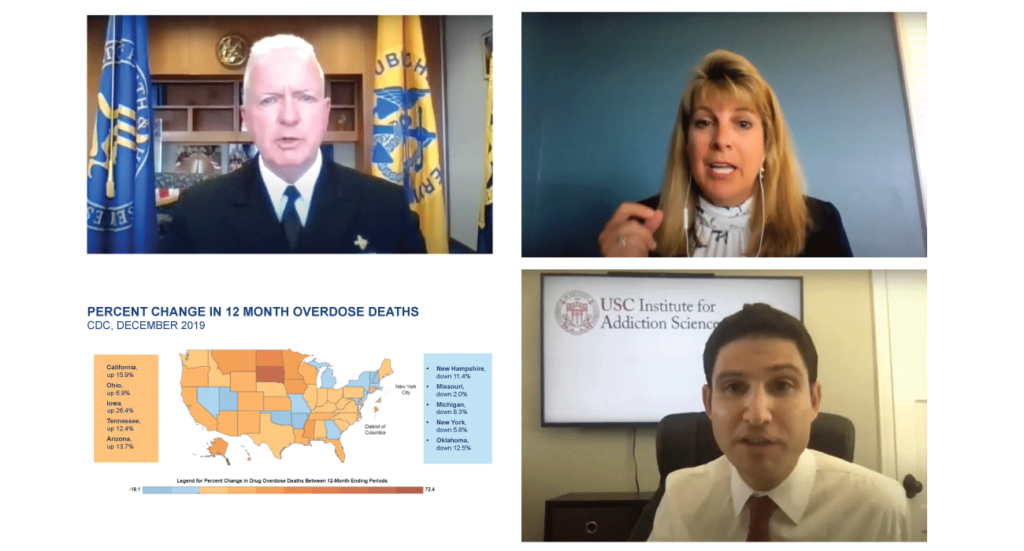Assistant Secretary for Health Admiral Brett P. Giroir, MD, sounded an alarm at a recent webinar cohosted by the USC Schaeffer Center and the Institute for Addiction Science: the COVID-19 pandemic is adversely affecting efforts to control substance abuse. He reported that overdose alerts increased 191% nationwide in the first four months of 2020 compared to the same period in 2019.
“All of our previous progress” in combating substance use disorders “is coming undone,” he said.
Giroir spoke from his Washington office during the July 23 webinar – entitled “The Intersection of Two Pandemics: Addiction and COVID-19.” Schaeffer Center Senior Fellow Rosalie Liccardo Pacula joined the discussion, which was moderated by Adam Leventhal, director of the USC Institute for Addiction Science.
The panel focused on the causes of the pre-pandemic rise in substance use disorder and why policy responses to COVID-19 (requests to physically isolate, shut down of businesses, and reduced physical access to healthcare) might cause those suffering from addiction to fare even worse.
Giroir oversees many of the nation’s key public health offices and programs, including the Office of the U.S. Surgeon General and Office of Health Promotion and Disease Prevention. Synthetic drugs such as fentanyl are by far the leading cause of overdoses, but prescription opioids are still a problem, he said. Overprescribing, already an issue, could accelerate under COVID-19 if reducing trips to a pharmacy becomes a priority.
Pacula highlighted issues surrounding access to substance use disorder treatment, and supportive services that keep people in recovery, which have been destabilized by requirements to physically distance and the shutting down of businesses. “Feelings of isolation and despair, coupled with lost employment and lost health insurance due to lost employment, are major concerns for those struggling with addiction, including those in recovery,” she said. A top priority for the federal government should be addressing growing uninsurance, which will get worse with higher rates of unemployment.
“We have to think of new ways to deliver services and help,” she said. Pacula holds the Elizabeth Garrett Chair in Health Policy, Economics & Law at the USC Price School of Public Policy.
Giroir said that the pandemic has exacerbated the challenges facing the 47.6 million Americans with a mental or behavioral disorder and the 20.3 million Americans with a substance abuse disorder. In particular, there are new obstacles for obtaining treatment was well as increasing stressors, including unemployment, isolation, illness and death. He added that COVID-19 disproportionately affects vulnerable populations who are at higher risk of substance abuse.
Leventhal agreed that minorities – who make up a sizeable proportion of essential workers on the front lines of the pandemic – are facing significant challenges, noting that “disparities are emerging in COVID-19 deaths.”
They also discussed the recent changes by Medicaid and Medicare to make access to telehealth more readily available, which potentially opens the door for providers outside a patients’ geographic area. At the same time, that requires good access to teleconferencing capability which leaves out many disadvantaged communities.
Overall, the intersection of the pandemic and addiction is “a set of interlocking crises,” Leventhal said. And policymakers and stakeholders need to take action now.
